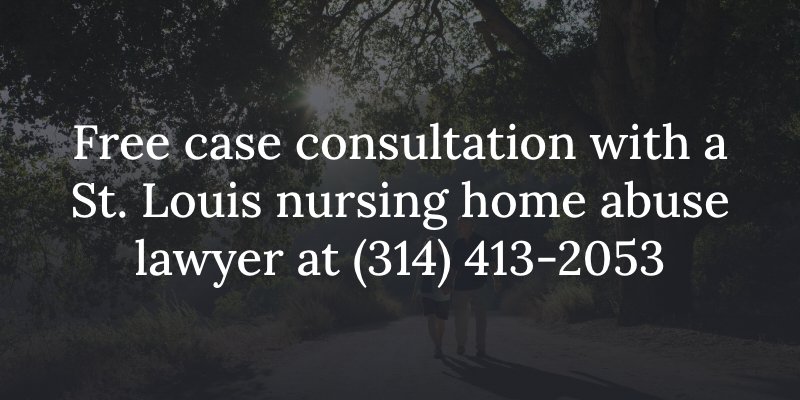St. Louis Nursing Home Abuse Lawyer
Request Free ConsultationOur elderly loved ones are our most cherished family members. When their care needs exceed the family’s abilities, we count on a nursing home to live up to what they promise in their glossy brochures. Nursing home administrators and caregivers have the responsibility to provide competent, compassionate care with respect for human dignity. Sadly, despite this legal duty, around five million nursing home residents suffer abuse each year. Missouri’s Division of Senior and Disability Services (DSS) investigates thousands of nursing home abuse cases annually, including in St. Louis.
If your elderly loved one suffered abuse in a nursing home, your family deserves justice as well as financial accountability. Call the nursing home abuse lawyers in St. Louis at Miller & Hine Attorneys at Law so we can be your elderly loved one’s voice for justice.
Why Choose Miller & Hine as Your Nursing Home Abuse Lawyers in St. Louis?
At Miller & Hine, we have a decades-long history of advocating for injury victims, including the vulnerable elderly who deserve compassionate care. We offer free consultations and only take a fee after we settle or win your case. We offer significant advantages to our clients, such as:
- Experience and resources from a team of professionals and founding attorneys who’ve dedicated their careers to obtaining justice and financial accountability for injury victims
- Skilled representation and legal advocacy from a collaborative team as well as the individual attention of an attorney dedicated to your case
- Sharp investigators, strong negotiators, and skilled litigators to handle all aspects of your case
Miller & Hine Attorneys at Law have a history of success, including a recent $800,000 win in a medical malpractice case. Our reputation puts a powerful voice behind your St. Louis nursing home abuse case.

What Types of Abuse Happen In St. Louis Nursing Homes?
The physical decline seen in elderly abuse victims is often dramatic, not only from the physical impacts of injuries and neglect but also due to feelings of fear, shame, and despair. The Nursing Home Abuse Center recognizes the following five categories of nursing home abuse in St. Louis and elsewhere.
Neglect
When nursing home staff members fail to provide basic, life-sustaining care, including ensuring adequate fluid intake, nutrition, necessary medications, and hygiene, it’s a form of physical and emotional abuse with devastating impacts on the elderly. Dehydration is a chronic problem in nursing home residents, leading to dangerous conditions like urinary tract infections and increased susceptibility to infections from dry, cracked skin and bedsores. In addition, neglecting to give an elderly resident their doctor-prescribed medication can be dangerous or even deadly.
When the elderly face inadequate nutrition and poor hygiene, and also remain unsupervised, unstimulated, and immobile throughout the day due to neglect, they experience a rapid physical and mental decline that sometimes leads to death.
Physical Abuse
An alarming number of nursing home residents experience egregious physical abuse, including punching, hitting, kicking, pushing, pinching, the use of unnecessary physical restraints, and other forms of rough treatment. Nursing home abuse can occur from caregivers, staff members, or from other residents.
Emotional Abuse
Emotional abuse is often as devastating to an elderly resident as physical abuse, causing physical and mental decline, isolation, and withdrawal from loved ones and social activities. Examples of emotional abuse in nursing home environments include yelling, name-calling, berating, belittling, bullying, harassing, abandonment (leaving a resident alone for long periods), moving personal items out of reach, threatening, intimidating, mocking, ridiculing, or humiliating.
One study found that 81% of nursing home caregivers acknowledged witnessing emotional abuse take place to their residents.
Financial Abuse
Elderly citizens are vulnerable to financial exploitation by those charged with their care, including in nursing homes where staff members may gain access to a resident’s accounts. Examples of elderly financial abuse include stealing cash or credit cards, transferring funds, forging signatures, writing checks from an elder’s account, using coercion to take money or assets, accessing an elderly resident’s home and using their belongings, and taking over an elderly resident’s financial affairs.
Sexual Abuse
Sexual abuse in nursing homes includes molestation, rape, and sexual assault from a caregiver, staff member, resident, or a person who comes into the home as a visitor. Sexual assault is reported in just under one percent of nursing home victims, but it is sadly believed to be widely underreported. Many elderly victims of sexual abuse are physically or cognitively unable to report their abuse. Others don’t report this type of abuse due to feelings of shame or fear of the stigma attached to sexual abuse.
Signs of Abuse in Nursing Homes
Sadly, many nursing home abuse victims aren’t able to report their abuse to the nursing home administrators or family members due to physical impairment, such as aphasia (inability to speak), dementia, and other cognitive impairments. Others fail to report abuse because they have feelings of shame and embarrassment or don’t wish to be a burden to loved ones. When visiting a family member in a nursing home, it’s important to watch for signs of abuse such as:
- Unexplained injuries
- Broken personal items like glasses and dentures
- Sudden change in appearance or demeanor
- Poor hygiene
- Sudden weight loss
- Dry, cracked lips and skin
- Unclean room
- Uneaten meals remaining in the room
- Torn clothing
- Emotional and social withdrawal
- Signs of restraint use, such as marks around the wrists and ankles
- Bruising, bleeding, or pain in the private parts
- Unexplained sexually transmitted diseases
- Reluctance to speak in front of caregivers
When a nursing home resident shows any of the above signs of nursing home abuse, their family members should report the situation to the nursing home administrators, the police, and their local ombudsman program. Have the resident undergo a thorough medical evaluation through a medical professional unaffiliated with the facility and ask for a detailed medical report.
Who Is Liable for Nursing Home Abuse Claims in St. Louis?
Nursing homes may cut corners by minimizing their staff, resulting in an unrealistic caregiver/resident ratio. Nursing home staff turnover rates are high, often resulting in inadequate or unqualified staff and poorly trained, overwhelmed caregivers.
When a nursing home resident suffers abuse, the nursing home breaches its duty of care, leaving the facility liable for damages.
What Can We Recover in a Nursing Home Abuse Case in St. Louis?
Nursing home residents and/or their family members may recover damages in a nursing home abuse case, including compensation for the following:
- Medical expenses
- Future medical expenses
- Any lost income, such as from family members who must leave work to care for an injured family member
- Pain and suffering
- Emotional anguish
- Wrongful death compensation
If nursing home abuse directly causes an elderly person’s death, their close family members may recover additional compensation through a nursing home wrongful death claim.
Call the St. Louis Nursing Home Attorneys at Miller & Hine
No one should have to take on the legal challenge of a claim or lawsuit against a nursing home in St. Louis, particularly while dealing with the pain and suffering of their elderly loved one, and the physical and cognitive decline that often results. Instead of taking on the nursing home, the insurance system, and possibly a court case, you can concentrate on your family and your loved one while we focus on obtaining the maximum compensation.

